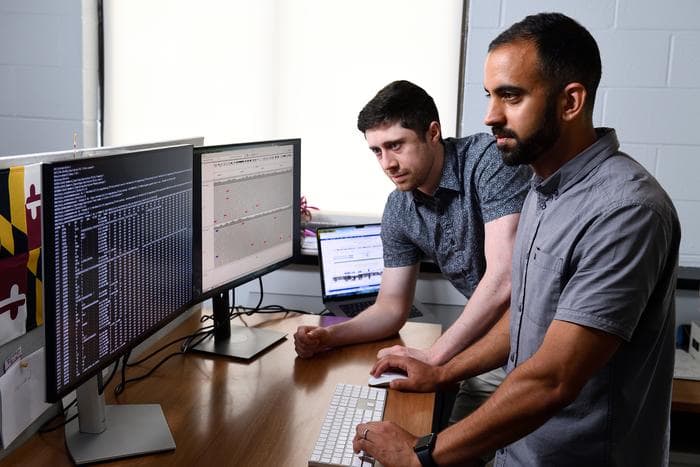Global gene expression study breaks European bias in genetic research
New research from Johns Hopkins University expands our understanding of genetic variation across diverse populations, potentially improving the accuracy of genetic predictions and personalised medicine.

Dylan Taylor (left) and Rajiv McCoy
A groundbreaking study led by researchers at Johns Hopkins University has produced a comprehensive catalogue of human gene expression data from a diverse global cohort. Published in Nature [1], this research addresses a longstanding bias in genetic studies towards individuals of European ancestry, offering new insights into genetic factors driving human diversity across understudied populations.
Expanding the scope of genetic research
Historically, the field of human genetics has been dominated by studies focusing on individuals of European descent. This bias has led to concerns about the applicability and accuracy of genetic predictions for people from other populations. The new study, spearheaded by geneticist Rajiv McCoy and his team at Johns Hopkins, aims to rectify this imbalance by examining gene expression patterns in a more diverse group of individuals.
“We now have this global view of how gene expression contributes to the world’s diversity, the broadest picture to date in populations that have been poorly represented in previous studies,” said McCoy, the study’s senior author. “We’re trying to better understand the connection between variation at the level of our DNA and variation at the level of our traits, which previous genetic studies have looked at but with a really persistent bias that often excludes non-European ancestry populations.”
Examining gene expression
While many genetic studies focus on differences in DNA sequences, this research takes a different approach by examining gene expression. This process involves the transcription of DNA into RNA molecules, which then serve as blueprints for protein production. Genetic mutations can affect this process, altering the amount or structure of RNA produced, which in turn can significantly impact trait development and disease susceptibility.
To identify mutations that influence gene expression, the researchers measured RNA in cells from 731 individuals who had previously participated in the 1000 Genomes Project. This allowed them to combine new gene expression data with existing genome sequences, providing a more comprehensive picture of genetic variation.
Shared patterns and individual differences
The study encompassed 26 different groups across five continents, revealing that gene expression patterns are often shared between populations. This finding mirrors similar observations in DNA variation patterns. Interestingly, the researchers found that most differences in gene expression occurred within populations rather than between them.
“The distribution of our diversity is more complex than these geographically, politically, or socially defined labels,” McCoy noted, highlighting the nuanced nature of human genetic diversity.
Implications for personalised medicine
The diverse cohort enabled the researchers to identify potential connections between specific mutations and traits or health risks, including those previously unexamined in certain populations. This could have significant implications for personalised medicine and targeted therapies.
Lead author Dylan Taylor, a doctoral candidate in biology at Johns Hopkins, emphasised the importance of diverse datasets in genetic research: “We can’t really use these studies in a predictive fashion for personalized medicine equitably unless we have more diverse datasets. If you try to use results from a study using only European individuals to predict gene expression in individuals from an underrepresented population – South Asians, for example – your results won’t necessarily be very reliable.”
Remaining challenges and future directions
Despite the study’s broad scope, the researchers acknowledge that significant gaps in representation still exist. The 1000 Genomes dataset lacks substantial samples from the Middle East, Australia, and the Pacific Islands, with limited representation from the Americas and Africa.
Taylor views their research as a proof of concept for the scientific community: “The field is starting to move in this exciting direction to include diverse individuals in human genetic studies. Our research is a proof of concept for other scientists. We are demonstrating we can really do this, and we should, and it’s valuable.”
Advancing global genetic understanding
This study represents a significant step forward in our understanding of human genetic diversity on a global scale. By providing a more inclusive picture of gene expression patterns across diverse populations, the research has the potential to improve the accuracy of genetic predictions and enhance our ability to develop targeted, personalised medical treatments.
Reference:
- Taylor, D., Chhetri, S. B., Tassia, M. G., et. al. (2024). Sources of gene expression variation in a globally diverse human cohort. Nature.
https://doi.org/10.1038/s41586-024-07708-2

